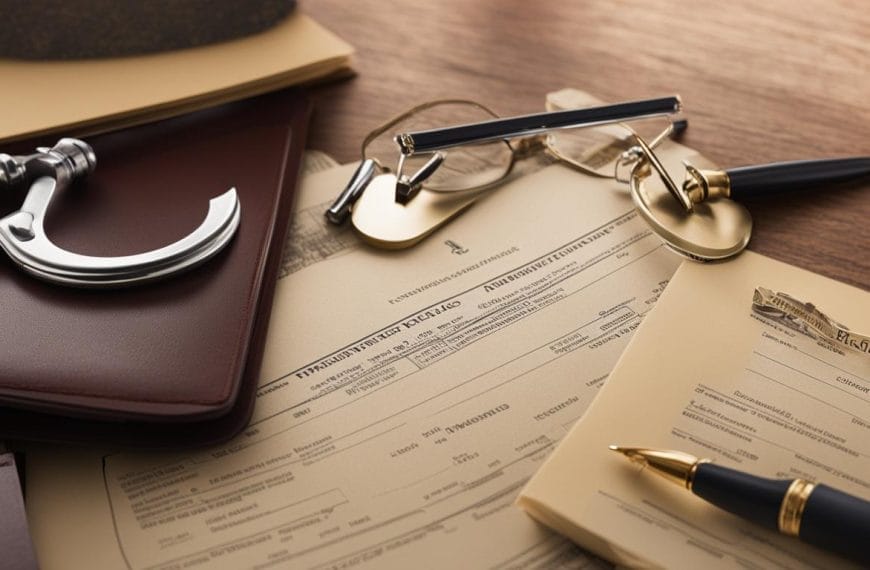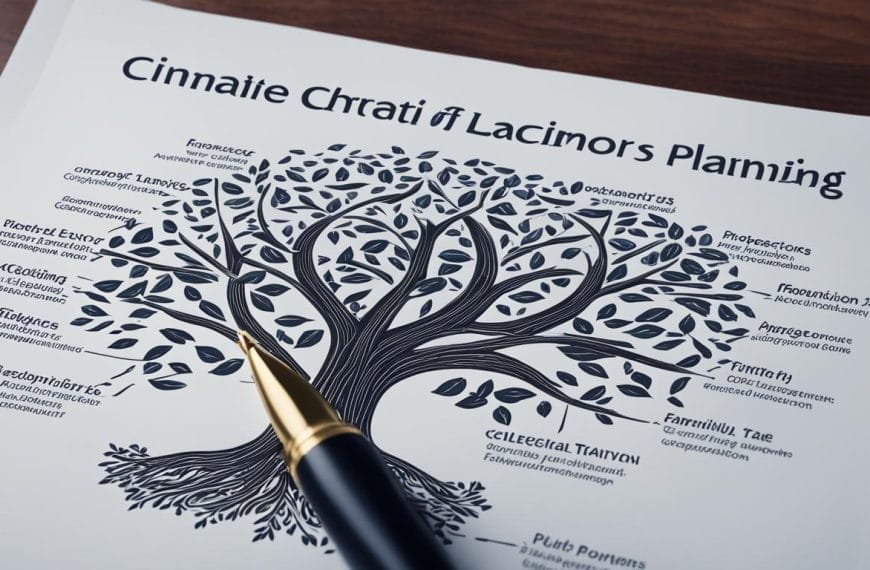Estate planning is a crucial process that involves more than just creating a will or trust. It is about ensuring that your assets are distributed according to your wishes and that your loved ones are taken care of. To achieve this, there are several important documents you need to consider:
- Will or Trust: A will or trust allows you to specify how your assets should be distributed after your death. It also enables you to name an executor who will be responsible for managing your estate.
- Power of Attorney: A power of attorney grants someone the authority to make legal and financial decisions on your behalf if you become unable to do so. It is essential to have both a financial power of attorney and a healthcare power of attorney to cover all aspects.
- Healthcare Directive: A healthcare directive, also known as a living will or advance healthcare directive, outlines your preferences for medical treatment if you are unable to communicate your wishes.
- Beneficiary Designation: Beneficiary designations are important for assets that can pass outside of a will, such as retirement accounts and life insurance policies. By naming beneficiaries, you ensure that these assets go directly to the intended individuals or organizations.
- Guardianship Designation: If you have minor children, it is crucial to name guardians who will take care of them in the event of your death. This ensures that your children will be cared for by someone you trust.
By having these essential estate planning documents in place, you can have peace of mind knowing that your wishes will be followed and your loved ones will be protected. It is important to consult with an estate planning professional to ensure that your plan is comprehensive and meets your specific needs.
The Importance of Wills and Trusts in Estate Planning
Estate planning involves several essential components, and wills and trusts play a pivotal role in ensuring your assets are protected and distributed according to your intentions. Let’s take a closer look at the importance of wills and trusts in the estate planning process.
Wills: Providing Clarity and Protection
A will is a legal document that specifies how your assets should be distributed after your death. It allows you to outline your wishes regarding the division of your estate and designate beneficiaries for your various assets. Additionally, a will enables you to name a guardian for your minor children, ensuring they are cared for by someone you trust.
When creating a will, it’s crucial to be as specific as possible regarding your intentions. Clearly identifying your assets and their intended recipients can help prevent conflicts and legal disputes among family members. Seek the assistance of an estate planning attorney to ensure your will is properly drafted and legally binding.
Trusts: Added Benefits and Flexibility
In addition to wills, trusts offer several advantages in estate planning. A trust allows you to transfer ownership of your assets to a trustee, who will manage and distribute them on behalf of your beneficiaries. By placing your assets in a trust, you can establish specific terms and conditions for the distribution of your wealth.
One key benefit of a trust is the ability to avoid the probate process. Assets held in a trust do not go through probate, which can be a lengthy and costly process. By bypassing probate, your loved ones can gain access to their inheritance more quickly and efficiently. Trusts can also provide tax advantages and help protect your assets from creditors.
It’s important to choose a trusted individual or entity to serve as the trustee of your trust. Consider someone who understands your wishes and is capable of managing your assets responsibly.
| Wills | Trusts |
|---|---|
| Specifies asset distribution | Facilitates asset management and distribution |
| Allows for naming guardians for minor children | Provides tax benefits and asset protection |
| Can be subject to probate | Avoids probate process |
By incorporating wills and trusts into your estate plan, you can ensure your assets are safeguarded and ultimately distributed to your intended beneficiaries. Consult with an estate planning professional to determine the best approach for your unique circumstances and goals.
The Role of Power of Attorney in Estate Planning
A power of attorney is a crucial document in estate planning that grants someone the authority to make important decisions on your behalf. It gives them the power to handle legal, financial, and healthcare matters if you become unable to do so.
Having a durable power of attorney is particularly essential as it remains in effect even if you become incapacitated. This ensures that someone you trust can step in and manage your financial affairs and make healthcare decisions based on your wishes. By designating a trusted individual as your agent, you can have peace of mind knowing that your interests are protected.
It’s also wise to consider setting up reciprocal powers of attorney with your spouse or partner. This allows both of you to have the authority to make decisions for each other if necessary, creating a comprehensive and secure estate plan.
When creating a power of attorney, it’s important to carefully consider your choice of agent. Select someone who is not only trustworthy but also capable of handling the responsibilities that come with the role. Open and honest communication with your chosen agent is crucial to ensure that they understand your wishes and can carry them out effectively.
Remember, a power of attorney is a powerful tool in estate planning that grants someone the legal authority to act on your behalf. By having this document in place, you can have confidence that your financial and healthcare decisions will be handled according to your wishes, even if you are unable to make them yourself.
Key Points:
- A power of attorney grants someone the authority to make legal, financial, and healthcare decisions on your behalf.
- Choose a durable power of attorney that remains in effect even if you become incapacitated.
- Select a trusted individual as your agent to handle your financial affairs and make healthcare decisions based on your wishes.
- Consider setting up reciprocal powers of attorney with your spouse or designate another trusted individual.
Understanding Beneficiary Designations and Guardianship Designations
Beneficiary designations and guardianship designations play a crucial role in estate planning. Let’s explore each of these designations and understand their significance.
Beneficiary Designations
When it comes to certain assets like retirement accounts and life insurance policies, beneficiary designations are essential. By naming beneficiaries, you ensure that these assets directly pass to the intended individuals or organizations without going through the probate process.
| Assets | Beneficiary Designations |
|---|---|
| Retirement accounts | Individuals or organizations |
| Life insurance policies | Beneficiary/beneficiaries |
By strategically assigning beneficiary designations to your assets, you can ensure a smooth transfer of these assets and avoid delays or complications in the distribution process.
Guardianship Designations
If you have minor children, guardianship designations hold significant importance in your estate plan. By selecting guardians, you can ensure that your children will be cared for by someone you trust, should anything happen to you.
| Minor children | Guardianship Designations |
|---|---|
| Under 18 years | Nominated guardian(s) |
Having guardianship designations in place provides peace of mind, knowing that your children will be in capable hands if the unexpected occurs.
Both beneficiary designations and guardianship designations are essential components of a comprehensive estate plan. By properly addressing these aspects, you can ensure the efficient and accurate distribution of your assets while safeguarding the well-being of your loved ones.
Conclusion
Estate planning is a crucial process that everyone should undertake, regardless of their financial situation. By having the essential documents in place, such as wills, trusts, powers of attorney, beneficiary designations, and guardianship designations, you can ensure that your assets are distributed according to your wishes and your loved ones are taken care of. These document essentials provide the necessary legal framework to protect your estate and ensure a smooth transition of your assets.
Regularly reviewing and updating your estate plan is essential to reflect any changes in your personal circumstances or financial goals. Life is unpredictable, and events such as marriage, divorce, birth, or the acquisition of new assets can significantly impact your estate plan. By staying proactive and keeping your documents up to date, you can ensure that your wishes are accurately reflected in your estate plan.
Consulting with an experienced estate planning professional is highly recommended. Their expertise can guide you through the complexities of creating an effective estate plan tailored to your specific needs. They can help you navigate the legal requirements, identify potential pitfalls, and ensure that your documents comply with all relevant laws and regulations.
Remember, estate planning is not a one-time event but a continuous process. By prioritizing document essentials such as wills, trusts, powers of attorney, beneficiary designations, and guardianship designations, you can provide peace of mind for yourself and your loved ones, knowing that your estate is in order and your intentions will be carried out according to your wishes.













